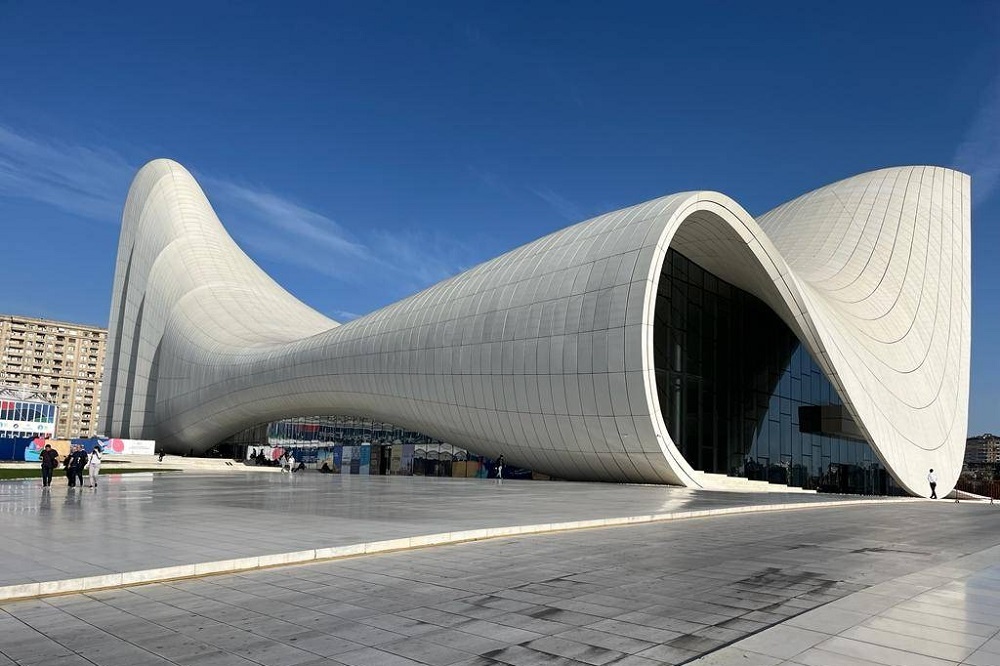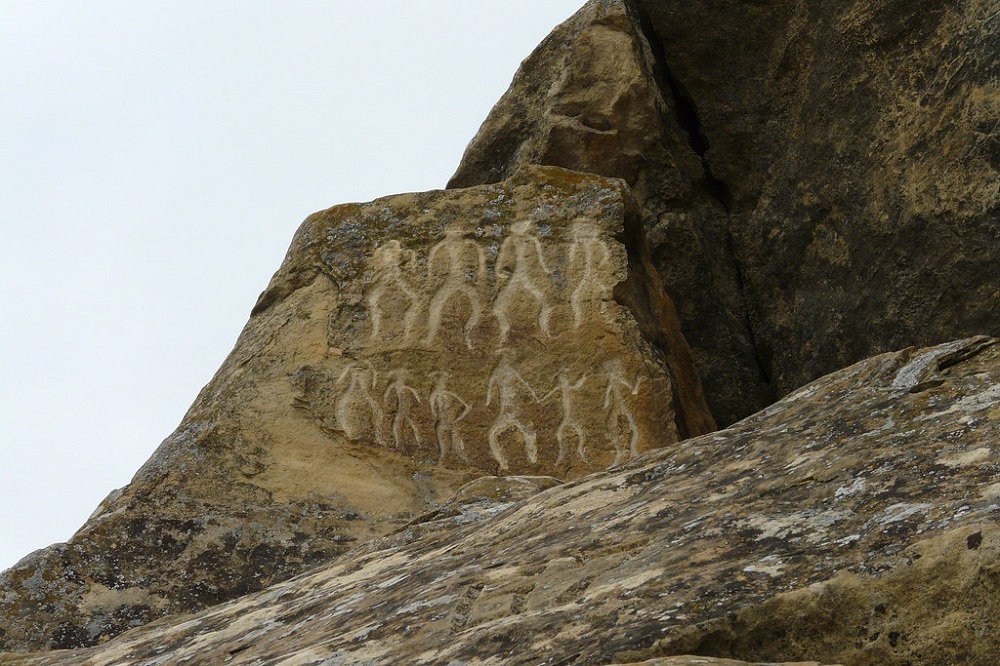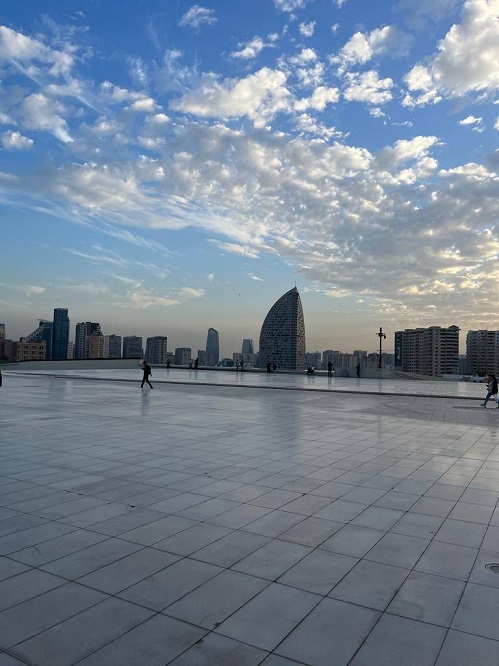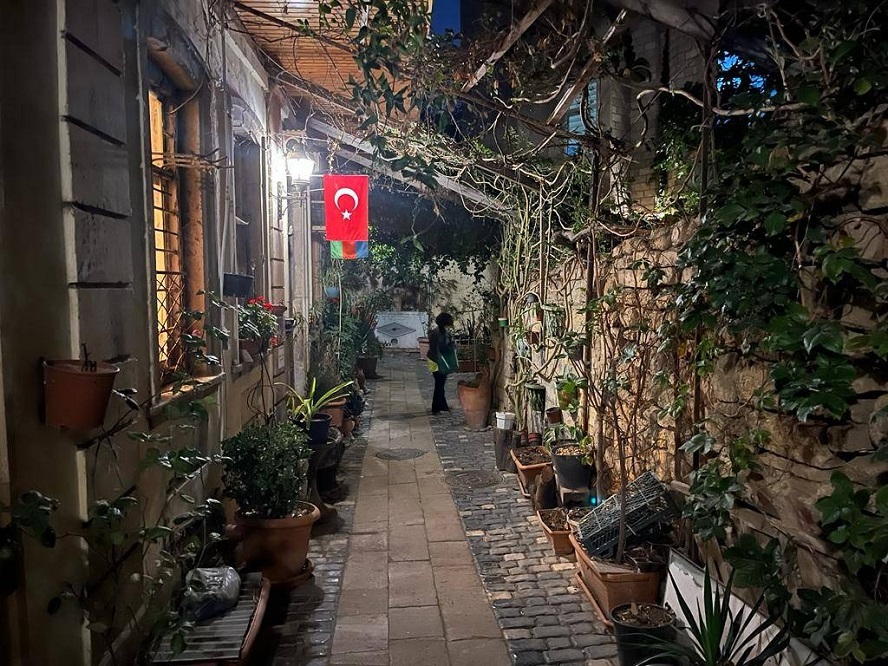Letter from Baku

Martin Shipton
Whatever constitutional status you favour for Wales, there’s a country at the crossroads of Europe and Asia that can set us an example about nation building.
Oil-rich Azerbaijan’s capital Baku is located on the Caspian Sea. It combines a beautiful and atmospheric old city with some of the most astonishing buildings to have been built in the 21st Century. Miraculously the new doesn’t jar with the old.
Thirty-two years ago the country emerged nervously from the dissolved Soviet Union as a self-governing nation – something it had little experience of, having previously been independent for just two years, from 1918 to 1920.
It was used to being invaded and colonised – by Persia, the Mongol Empire, Tamerlane and latterly Russia, all of which saw subservience to the central power as the defining principle.
My visit to Baku comes a month after Azerbaijan took back by force from ethnic Armenians the disputed mountainous region of Nagorno-Karabakh. Azerbaijan has long had a hostile relationship with its neighbour Armenia, focussed largely on who should control N-K. A war took place at the time the Soviet Union broke up, and there was ethnic cleansing on both sides.
Ethnic Armenians drove out Azerbaijan from the region. Fighting broke out again in 2020, when Azerbaijanis succeeded in seizing most of the territory back. They finished the job in September.
My only experience of being in a country that has won a convincing military victory was in the UK in 1982, when the Falkland Islands were reclaimed from Argentina after a brief occupation. The London-based tabloids engaged in their usual hyperbole, rejoicing in the deaths of Argentinian soldiers and celebrating as if the victory was as significant as the end of World War Two.
Triumphalism
I wasn’t in Baku at the time of Azerbaijan’s success in the recent conflict, but I suspect the triumphalism was more restrained. There are, however, lots of national flags around and a couple of plaques in the old city honouring individual Azerbaijani troops who were killed in 2020.
But the verbal response from ordinary people to questions about the victory tends to be quite matter-of-fact. A museum guide told me: “That’s the end of the problem between us and the Armenians. There will now be peace. We won.”
However, a history teacher who approached me for a chat in the street said in an equally matter-of-fact way: “My father fought against the Armenians in the early 1990s. He says we can never be friends with Armenia because of the massacre of hundreds of Azerbaijani civilians at [the town of] Khojaly that happened in 1992.”
The guide that I quoted works in a small museum in the flat where the Baku-born celebrity cellist Mstislav Rostropovich, who died in 2007, lived with his parents as a boy. Although ethnically Russian, Rostropovich, who defected to the West from the Soviet Union, has been adopted by Azerbaijan as one of its own.
It becomes clear very quickly in Baku that culture in the artistic sense is taken very seriously and seen as a vital element of the Azerbaijani nation’s character. About 60 kilometres from Baku is Gobustan, where some of the world’s oldest rock drawings – some dating back to 10,000 BC – are to be found. They are presented as evidence of the longevity of Azerbaijani culture and have been endorsed as such by the current President Ilham Aliyev, as well as his father Heydar Aliyev, who preceded him as head of state.

Personality cult
There is a strong personality cult around Heydar Aliyev, who died in 2003. A taxi driver described him – perhaps rather fancifully – to me as “our Mahatma Gandhi”, without whom Azerbaijan would not have existed as an independent country.
Whatever the truth, his name adorns the Heydar Aliyev Centre, which is arguably the most stunning building erected anywhere in the world in the 21st Century so far. It was designed by the British-Iraqi architect Zaha Hadid, whose Opera House for Cardiff Bay never got built because it was thought more appropriate to spend public money on a rugby stadium.
The Heydar Aliyev Centre is breathtaking, both from the outside and inside. Built on a hill with fine views over the city below, it challenges and confounds notions of geometry and gravity, making a bold architectural statement. Inside are displayed artifacts that provide further evidence of Azerbaijan’s creativity: incredible carpets and musical instruments, as well as a scale model of many significant buildings across the country.
Other new structures like the Flame Towers – three illuminated skyscrapers in the shape of flames, symbolising Azerbaijan’s long history as a centre of Zoroastrian fire worship – are similarly powerful. All of this is, of course, a further dimension of the nation-building project. Of course we have impressive modern buildings in Wales like the Senedd, but too often there is a lack of imagination and aesthetic sense that lets our nation down.

As I walked along the street to my old city hotel, I was approached by two young men who were touting for business as tour guides. But instead of trying to sign me up for a city tour, they asked me what at first I found a strange question: “Are you Jewish?”, they said. I responded that I am not, but they said I look Jewish and that they are Jewish themselves.
We proceeded to have a 15-minute conversation on the street about the current war between Israel and the Palestinians. While all of us agreed that the massacre carried out by Hamas was outrageous, we also agreed that what happened has to be seen in a historical context and that the treatment being meted out to Palestinians in Gaza is wholly unacceptable.
These young men are not visitors from Europe or Israel – they are Baku-born Jews. They told me they have encountered no anti-semitism in their lives whatsoever – something I find immensely reassuring and a credit to Azerbaijan.
Restrictions
Although the majority of Azerbaijanis are Muslims, this is a secular society with, it seems, none of the restrictions imposed in places where political Islam is in the ascendancy. This makes for a nation where creativity is encouraged rather than frowned upon, and that has to be a good thing.
One evening we went in search of a particular restaurant in my guidebook, but it turned out to be closed. This was a blessing in disguise, as we had the good fortune to meet two remarkable women who are bringing originality and flair to Baku’s cultural scene.
Sabina Hajiev is a gynecologist originally from Baku who used to work in Hanover, Germany. She has literary interests and one of her favourite writers is Kurban Said, who died aged 37 in 1942, is virtually unknown in the UK but whose book Ali and Nino is regarded as the great novel of the Caucasus. It has been translated into many languages.
Sabina has opened a restaurant in the old city, steps away from the iconic Palace of the Shirvanshahs, where Said used to enjoy spending time. The restaurant has a pleasantly literary ambiance, with displays related to Said and his work from material Sabina has collected over the years. The food is also very good – I enjoyed the lamb with pomegranate.

Jazz club
Not far away, also in the old city, is a jazz club we also came across by accident called Best Place owned by Elmira Ismayilova. Elmira used to work in the oil industry and did some of her training in Middlesbrough, where I used to work.
Jazz is popular in Baku, and if music is playing in the background in restaurants, it is likely to be mellow jazz – something of a contrast to the over-loud pop and rock music often heard in restaurants in Britain. The jazz trio we heard in Elmira’s club was of the quality you’d expect in Ronnie Scott’s in London.
It was inspirational to come across two such imaginative women in one evening – both of whom are adding to the diversity of Baku and enhancing its reputation as a world-class city of culture. This is even more remarkable when one considers that less than 300 kilometres to the south lies the theocratic tyranny of Iran.
I don’t want to give the impression that Azerbaijan is without blemish. Strong criticisms of the ruling regime have been made by human rights organisations like Amnesty International and Human Rights Watch over its attitude towards political opponents and media freedom. From a nation building point of view, however, there is much to admire, especially in the wider cultural sphere.
Support our Nation today
For the price of a cup of coffee a month you can help us create an independent, not-for-profit, national news service for the people of Wales, by the people of Wales.





